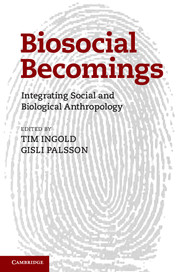Book contents
- Frontmatter
- Contents
- Preface
- 1 Prospect
- 2 Ensembles of biosocial relations
- 3 Blurring the biological and social in human becomings
- 4 Life-in-the-making: epigenesis, biocultural environments and human becomings
- 5 Thalassaemic lives as stories of becoming: mediated biologies and genetic (un)certainties
- 6 Shedding our selves: perspectivism, the bounded subject and the nature–culture divide
- 7 Reflections on a collective brain at work: one week in the working life of an NGO team in urban Morocco
- 8 The habits of water: marginality and the sacralization of non-humans in North-Eastern Ghana
- 9 ‘Bringing wood to life’: lines, flows and materials in a Swazi sawmill
- 10 Humanity and life as the perpetual maintenance of specific efforts: a reappraisal of animism
- 11 Ravelling/unravelling: being-in-the-world and falling-out-of-the-world
- 12 Retrospect
- References
- Notes on the contributors
- Index
5 - Thalassaemic lives as stories of becoming: mediated biologies and genetic (un)certainties
Published online by Cambridge University Press: 05 June 2014
- Frontmatter
- Contents
- Preface
- 1 Prospect
- 2 Ensembles of biosocial relations
- 3 Blurring the biological and social in human becomings
- 4 Life-in-the-making: epigenesis, biocultural environments and human becomings
- 5 Thalassaemic lives as stories of becoming: mediated biologies and genetic (un)certainties
- 6 Shedding our selves: perspectivism, the bounded subject and the nature–culture divide
- 7 Reflections on a collective brain at work: one week in the working life of an NGO team in urban Morocco
- 8 The habits of water: marginality and the sacralization of non-humans in North-Eastern Ghana
- 9 ‘Bringing wood to life’: lines, flows and materials in a Swazi sawmill
- 10 Humanity and life as the perpetual maintenance of specific efforts: a reappraisal of animism
- 11 Ravelling/unravelling: being-in-the-world and falling-out-of-the-world
- 12 Retrospect
- References
- Notes on the contributors
- Index
Summary
My ethnographic journey of exploration into thalassaemic lives took place in an era characterized by the catalytic role of biomedicine in widening the spectrum of theories, tools and concepts available for understanding, constructing and reconstructing life. Bodies, biologies, organisms, genes, genomes, tissues, organs, behaviours, intentions, environments, human and non-human animals, plants as well as inanimate objects become increasingly problematic when fixed as concepts and entities. We are witnessing the inevitable conflation of nature and culture, biology and society, body and mind, of underlying dualisms shaping previously well-separated disciplines focusing on the study of human life. Even though our increasing knowledge of the potentiality of human and non-human genetic material and how it interacts with many other forces of life has led to persisting determinisms and reductions, other theoretical currents have been equally informative, more holistic and inclusive in nature, offering insights into the ways genetic material is situated within – but is not a primary determinant of – the process of living. If anthropology has a tradition of fixing dualistic understandings of the world, it has also contributed to the systematic appreciation of diverse ways of living, emphasizing context sensitivity, self-understanding, agency, and relationality, all of which have tended to erode this fixity.
For this chapter, I have drawn from ethnographic research on thalassaemia in Greece during the period 2003–2006. Thalassaemia is a well known monogenic disease. It is broadly defined as an inherited disorder caused by defective and imbalanced globin production resulting in severe and often life-threatening anaemia. It belongs to a wider group of inherited human haemoglobin disorders (linked to structural variants and hereditary persistence of fetal haemoglobin). The term thalassaemia is derived from two Greek words: θάλασσα (thalassa) meaning the sea and αίμα (aima) meaning blood. The term itself reflects the high prevalence of the condition in Mediterranean countries. The β-thalassaemias present the biggest health problem globally when compared with the other types (α-, δβ-, εγδβ-), and represent the most common type in Greece.
- Type
- Chapter
- Information
- Biosocial BecomingsIntegrating Social and Biological Anthropology, pp. 84 - 105Publisher: Cambridge University PressPrint publication year: 2013
- 4
- Cited by



